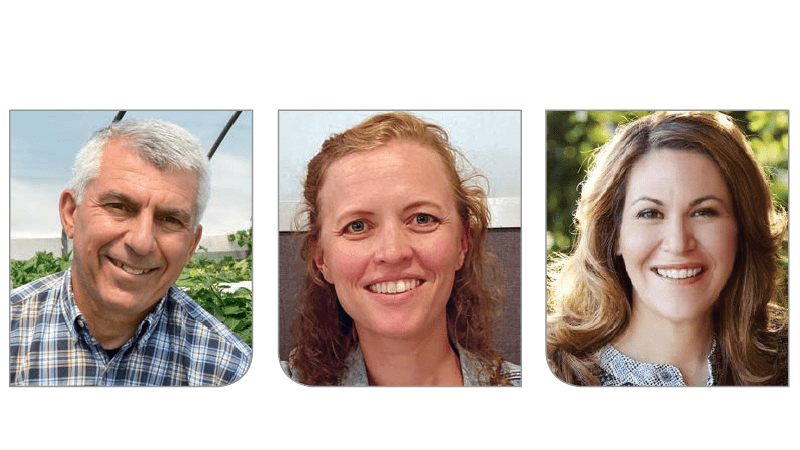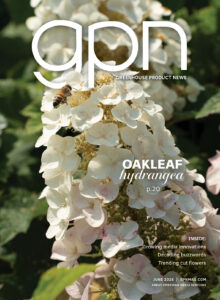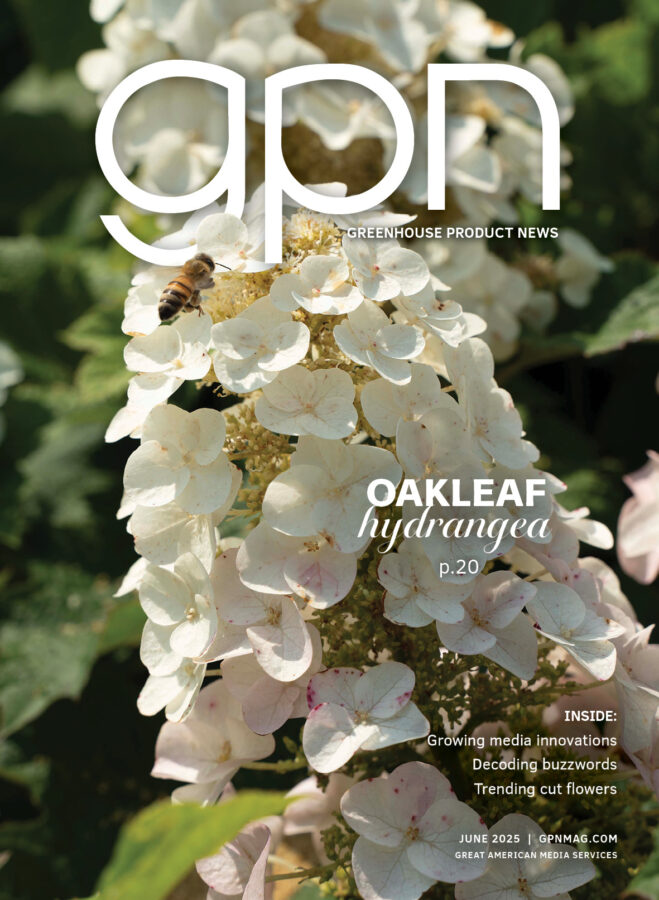
Duets: Gender Bias in Horticulture: Part 2
Today’s guests are Molly Dishman and Pam Temko. Molly is the daughter of Dave Bartlett of Bartlett Instruments, a manufacturer of environmental control systems for small- to medium-sized greenhouse applications. Pam is the general manager of Dosatron International, a supplier of fertilizer/chemical injectors used throughout the horticulture industry.
Peter: The gender bias topic was introduced in the October column from the perspective of two industry leaders of my generation, Bridget Behe at Michigan State University and Lela Kelly, owner of Dosatron … and Pam’s mom! I’ll refer to their comments during this conversation to reference generational progress and underscore where you two feel more progress is needed. Please start by sharing
your early career experiences.
Molly: I have worked for Bartlett Instrument Co. officially since 2018, but as a family business I’ve worked there unofficially longer. I graduated from the University of Iowa with a degree in computer science and marketing, and then joined ThoughtWorks Inc., an IT consultancy company. The computer science industry’s struggles parallel some of the struggles the horticulture industry is seeing in closing the gender gap.
Pam: After I turned 16, my parents, Lela and Eddy Kelly, informed me I would start working in the family business. No options. And as you can imagine, like most teenagers, I wasn’t too thrilled about the idea. I have done every job at Dosatron: answered phones, clerical, repairs, warehousing and helped in accounting. After high school, I attended undergraduate school at Georgia Southern University and then Kennesaw State University for a master’s in business administration.
Peter: Knowing both of your families makes me appreciate different paths children take in joining their family businesses. My experience hybridized both of yours. It was my dad’s dream for me to join him in his greenhouse business, but he never pressured me.
My mom pushed me away to graduate school and academia. She wanted me to see the outside world before deciding to come home. How sage her advice was; I loved my time as a university professor and left without regret knowing I chose something I loved even more. Parents have many jobs, and one is to give us strong wings and deep roots. We’ll come back to the topic of parents. Next, how have you experienced gender bias in your horticultural careers?
Pam: I work in various industries including livestock and poultry animal health, car wash, metal processing, water treatment, and food processing. And, of course, one of our key industries is the horticulture and irrigation sector, including ornamentals and food crops. Recently we had a big emphasis on the cannabis market.
It quickly became apparent that no matter which industry I was involved in, they were all male-dominated industries. The women working in these industries are in the minority. I saw how my mom navigated this world, and I was able to take those lessons and apply them to my work.
Molly: I have experienced gender bias firsthand. I’ve been asked when the engineer will be back at our booth. I’ve been told my seat on the plane has been saved because I’m the skinny, pretty person on the way back from a horticulture conference. These are in the minority, but they still happen.
Computer science has an interesting story arc on this topic. In 1984, the number of women in the industry was 37%, but today it’s only 18%. A big challenge this creates in both industries is a lack of role models. If you don’t see people similar to you in an industry, it’s hard to picture yourself there. I, however, did not have that problem; my mom is a computer scientist and also works at Bartlett Instrument Co.
Pam: I sometimes experience gender bias when speaking to an unfamiliar male who immediately asks to speak with someone else. They assume a woman does not have the technical knowledge to answer their question. The only way to overcome that bias is to be technical enough to answer their question.
I have worked hard on understanding our products and their practical applications. That means knowing how the pumps work, how they are maintained, what happens when they break and best practices for installations. With that level of expertise, even the most reluctant male realizes that we are their equal in this area. Because of the example my mother set, it doesn’t even cross my mind that I am not equal to any male.
Peter: Bridget and Lela both talked about strong moms who taught them life lessons. The two of you cite learning from your moms, but you’re also benefiting in another way. Your moms are role models in our industry, not just in your private lives. They’ve impacted your careers and Molly, to your point, they’ve allowed you to see yourselves here.
Pam: Peter, I think there has been generational progress. My mother was one of the only female sales reps on Long Island, a very tough market with a heavy male persona. Mom set a great example of not being intimidated by men. My mom had to fight for respect. I don’t necessarily have to fight for it to the extent she did. I can leverage the baseline she has already set.
People respect my mom because she knows our products and how they provide solutions to customer problems. She always set good examples of professionalism when dealing with all types of people. She also illustrated the personal rules we needed to follow to be successful at work, like getting enough sleep, eating well, dressing professionally, etc. I have the benefit of having a strong mentor that helped shape my career, especially when it came to working in male-dominated environments.
Peter: Pam, I’ve sat on committees and boards with Lela and Bridget; their professionalism cruises in gender-less rare air. And yes, our moms taught the importance of eating well and going to bed early. I hope dads are demanding clean plates, completed homework and “lights out” too.
Molly: My dad has always done a good job of modeling behaviors for us — both at home and professionally. Both of my parents have also set us up so we could learn by doing. When I rejoined the family business, my dad allowed me to lead initiatives and use him as an expert reference. We could enable more women in horticulture if men voluntarily played a support or coaching role.
Pam: I was very fortunate in the exposure I received from my parents. During summer, Lela and Eddy would bring us to trade shows; we were the proverbial “trade show” kids running around grabbing candy and knickknacks. But it gave me a chance to see my mom in action. She was able to mentor me. It was a real “bring your daughter to work” thing. I could see how she handled different situations. I understood how my parents fashioned the company philosophy around being 100% customer-centric.
Peter: What does our industry need to do to achieve equality and inclusivity? My wife and I have raised a daughter, and four of our five grandchildren are girls. I need to keep getting better to shape a world where they can achieve their dreams.
Molly: One thing I’ve noticed in horticulture is events advertised with little to no diversity, gender or otherwise. A recent executive conference promoted a group of experts that was all men and men older than me. I think the horticulture industry needs to start setting targets for diversity at events, conferences and in publications. I was part of GPN’s 40 Under 40 this year — one of 18 women (go to gpnmag.com/40-under-40-awards). Eighteen of 40 is approaching equality, but I don’t see this happening on conference programs, advisory boards, etc.
Cultivate has started a Women in Horticulture luncheon, which has been wildly successful. This past year, the speaker was a motivational speaker from outside the industry. There are many women in this industry with outstanding accomplishments who also have meaningful messages. For example, Bridget Behe and Lela Kelly joined you in this column recently; it seems like another opportunity lost when women like them are not in these speaking slots.
We need to keep going and do more. Design conference programs to ensure there is one woman speaking at each time slot. Have networking sessions specifically for women. Create opportunities for junior women to work with a professional, motivational speaker to create content.
Peter: That’s an excellent point, Molly, to have at least one woman speaking in each conference time slot. Once that becomes routine, equality in a 50-50 speaker split will follow. Once that becomes routine, our daughter’s daughters will only know inclusivity.
Pam: Until then, I think a woman needs to have thick skin. You can’t take offense to every slight. My mom taught me to be confident. You only get that confidence by working hard and learning the business.
Molly: I’m at the point on my path where I would like to focus more on what to do and what to change than focusing only on the problems. However, we can’t move forward with women alone, and getting allies and advocates from men in the horticulture industry is important.
You, Peter, are doing this with your work right here and now. Men in leadership positions have to continue to find opportunities to create a more diverse and inclusive industry. You can insist any event you participate in has diversity targets, suggest women for speaking roles and nominate women for industry recognition. And, yes, practice the simple habit of speaking less and listening more.
Peter: Thank you both for sharing your experiences and expectations. Given the roles our moms play in our careers, I’m going to lobby for a GPN 40 Under 40 spin off — Matriarch Mentors.
For an enhanced reading experience, view this article in our digital edition by clicking here.









 Video Library
Video Library 


















